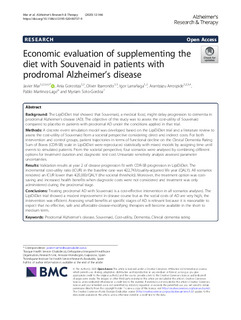| dc.rights.license | Attribution 4.0 International | * |
| dc.contributor.author | Soto-Gordoa, Myriam | |
| dc.contributor.other | Mar Medina, Javier | |
| dc.contributor.other | Gorostiza, Ania | |
| dc.contributor.other | Ibarrondo Olagüenaga, Oliver | |
| dc.contributor.other | Arrospide, Arantzazu | |
| dc.contributor.other | Martinez-Lage, Pablo | |
| dc.date.accessioned | 2020-12-14T11:26:05Z | |
| dc.date.available | 2020-12-14T11:26:05Z | |
| dc.date.issued | 2020 | |
| dc.identifier.issn | 1758-9193 | en |
| dc.identifier.other | https://katalogoa.mondragon.edu/janium-bin/janium_login_opac.pl?find&ficha_no=162066 | en |
| dc.identifier.uri | https://hdl.handle.net/20.500.11984/1964 | |
| dc.description.abstract | Background: The LipiDiDiet trial showed that Souvenaid, a medical food, might delay progression to dementia in prodromal Alzheimer’s disease (AD). The objective of this study was to assess the cost-utility of Souvenaid compared to placebo in patients with prodromal AD under the conditions applied in that trial.
Methods: A discrete event simulation model was developed based on the LipiDiDiet trial and a literature review to assess the cost-utility of Souvenaid from a societal perspective considering direct and indirect costs. For both intervention and control groups, patient trajectories in terms of functional decline on the Clinical Dementia Rating Sum of Boxes (CDR-SB) scale in LipiDiDiet were reproduced statistically with mixed models by assigning time until events to simulated patients. From the societal perspective, four scenarios were analysed by combining different options for treatment duration and diagnostic test cost. Univariate sensitivity analysis assessed parameter uncertainties.
Results: Validation results at year 2 of disease progression fit with CDR-SB progression in LipiDiDiet. The incremental cost-utility ratio (ICUR) in the baseline case was €22,743/quality-adjusted life year (QALY). All scenarios rendered an ICUR lower than €25,000/QALY (the societal threshold). Moreover, the treatment option was costsaving and increased health benefits when diagnostic costs were not considered and treatment was only administered during the prodromal stage.
Conclusions: Treating prodromal AD with Souvenaid is a cost-effective intervention in all scenarios analysed. The LipiDiDiet trial showed a modest improvement in disease course but as the social costs of AD are very high, the intervention was efficient. Assessing small benefits at specific stages of AD is relevant because it is reasonable to expect that no effective, safe and affordable disease-modifying therapies will become available in the short to medium term. | en |
| dc.language.iso | eng | en |
| dc.publisher | BioMed Central Ltd. Part of Springer Nature | en |
| dc.rights | © The Author(s). 2020 | en |
| dc.rights.uri | http://creativecommons.org/licenses/by/4.0/ | * |
| dc.subject | Prodromal Alzheimer’s disease | en |
| dc.subject | Souvenaid | en |
| dc.subject | Cost-utility | en |
| dc.subject | dementia | en |
| dc.subject | Clinical dementia rating | en |
| dc.title | Economic evaluation of supplementing the diet with Souvenaid in patients with prodromal Alzheimer's disease | en |
| dcterms.accessRights | http://purl.org/coar/access_right/c_abf2 | en |
| dcterms.source | Alzheimer's Research and Therapy | en |
| local.contributor.group | Innovación, gestión, organización | |
| local.description.peerreviewed | true | en |
| local.identifier.doi | https://doi.org/10.1186/s13195-020-00737-9 | en |
| local.rights.publicationfee | APC | en |
| local.rights.publicationfeeamount | 2570 EUR | en |
| local.source.details | Vol. 12. N. Articulo 166, 2020 | en |
| oaire.format.mimetype | application/pdf | |
| oaire.file | $DSPACE\assetstore | |
| oaire.resourceType | http://purl.org/coar/resource_type/c_6501 | en |
| oaire.version | http://purl.org/coar/version/c_970fb48d4fbd8a85 | en |








